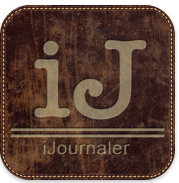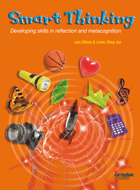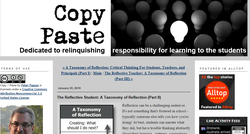Measuring Success...
Why measure the success of mobile learning in my classroom?
Why gather data on learning outcomes?
Why collect evidence of improved student attitudes, engagement, literacy or numeracy development?
Evidence-based practice is emerging as an important critical approach within a number of professions, including education. How can teachers collect data to support reflective practice and inform future planning and policy-making decisions?
Why do we even need to consider this?
Exploring the use of mobile devices in the classroom can unearth many detractors, many of whom may be influential in funding allocations and policy-making. Comments like, "Why is my child using a 'toy' at school?" and "Why can't you cut out the fancy stuff and get back to teaching the basics?" may be commonplace. Evidence to demonstrate the improvement of learning outcomes and achievements can turn detractors into supporters.
Providing hardware and accessing appropriate professional learning opportunities to support the embedding of ICLTs can become a costly exercise. Hard evidence as to the benefits of mobile learning and improved literacy / numeracy outcomes can be a powerful influence in supporting further investment in mobile learning.
Why gather data on learning outcomes?
Why collect evidence of improved student attitudes, engagement, literacy or numeracy development?
Evidence-based practice is emerging as an important critical approach within a number of professions, including education. How can teachers collect data to support reflective practice and inform future planning and policy-making decisions?
Why do we even need to consider this?
Exploring the use of mobile devices in the classroom can unearth many detractors, many of whom may be influential in funding allocations and policy-making. Comments like, "Why is my child using a 'toy' at school?" and "Why can't you cut out the fancy stuff and get back to teaching the basics?" may be commonplace. Evidence to demonstrate the improvement of learning outcomes and achievements can turn detractors into supporters.
Providing hardware and accessing appropriate professional learning opportunities to support the embedding of ICLTs can become a costly exercise. Hard evidence as to the benefits of mobile learning and improved literacy / numeracy outcomes can be a powerful influence in supporting further investment in mobile learning.
Can You Help Us?
Hard evidence can be collected as QUALITATIVE and QUANTITATIVE data. Qualitative data includes the use of surveys, blogs and journals to measure the affective influence of technology. Quantitative data includes scores based on specific criteria, for example improved literacy and numeracy outcomes. Research on
mobile technologies using quantitative data has been difficult
to find. Please help by posting a link or reference to any known quantitative research data on the wall wisher.
mobile technologies using quantitative data has been difficult
to find. Please help by posting a link or reference to any known quantitative research data on the wall wisher.
Which Data?
When measuring success, assessing student progress and achievement can occur by looking at the three types of assessment: assessment OF learning, assessment FOR learning and assessment AS learning. View the 'prezi' below for an understanding of these three types of assessment and how they can be used with iPod and iPad apps.
Resources for Measuring
Here are some documents and work samples that may be useful for data gathering exercises. They include surveys for students and parents and links to examples of reflective practice resources.

MOBILISed is licensed under a Creative Commons Attribution-NonCommercial-ShareAlike 3.0 Unported License.






